Poverty
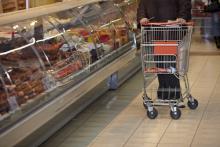
“So what are food stamps anyway?” my 8-year-old son, Mattias, asked as I drove him to his summer camp this morning. “Are they, like, stamps that you eat that taste like different foods?”
“Not exactly,” I said.
My family was less than thrilled when I presented the idea of living on the equivalent of what a family of four would receive on food stamps for a week. Actually, the program is now called “SNAP,” which stands for “Supplemental Nutrition Assistance Program,” and involves government-issued vouchers or debit cards, rather than the antiquated stamp method. But the result is the same; we have a lot less to spend on food this week than usual.
“But I don’t want to be poor,” Mattias moaned as I explained the challenge to him.
“We’re not poor,” I said, “but it’s important for us to know what it’s like to struggle to feed our family.”
“Why?”
“Because,” I paused, trying to figure out a way to explain privilege and compassion to a third-grader who was quite content to have all he has, and then some, “Jesus tells us to have a heart for the poor, but how can we really do that if we don’t know anything about what it’s like to live with less?”
“Hmm,” he wrinkled his brow, “I guess we can do it for a few days.”

After putting out there that we’re going to do the SNAP Challenge August 20-26th (living on the budgeted equivalent of food stamps for a week for meals), some folks came forward with some really helpful resources. Even if you’re not on public assistance and not planning to take part in the challenge, these are useful tools to help anyone on a budget plan for some good, nutritious meals.
Here’s a video clip on meal prep with only food bought on the food stamp budget, along with the list of groceries the chef bought on the budget: Mario’s Food Stamp Challenge Grocery List
Here are dozens of recipes from Harvesters Food Network you can do on a food-stamp-equivalent budget, complete with nutrition information for each meal: Harvesters Food Network SNAP Recipes
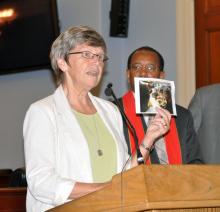
Sister Simone Campbell sat down with Fox News' Bill O'Reilly to discuss her organization's push for a faithful budget.
Campbell, executive director of NETWORK, recently invited presidential candidate Mitt Romney to join the Nuns on the Bus in some of their charitable work with the poor.
Writing in response to Peter Edelman's article on ending poverty in America, Tim Worstall counters:
The reason we can’t end poverty in America is not because the country isn’t rich enough to do that: it is rather because of the ignorance of those who would end poverty in America. Peter Edelman has an Op/Ed in the New York Times which shows this to horrific effect. And what’s really worrying is that Edelman is supposedly one of the experts on how we ought to reduce poverty.
One point that has to be made about poverty right at the start: to all intents and purposes America, like all other industrialised nations, has abolished poverty. What we have traditionally called poverty that is. Proper destitution, people dying of starvation in the streets from the lack of the wherewithal to purchase food. Absent drug or mental problems this simply does not happen any more. The reason being that we’ve all had those industrial revolutions and the societies are rich enough that we make sure such doesn’t happen. Sure, different places have different ways of doing it, some more governmental and tax based than others, but that basic job of feeding the starving, clothing the naked and sheltering the homeless does get done.
Read more here
Peter Edelman writes for The New York Times:
The Associated Press reports on new analysis on global poverty:
Poverty across the planet will be virtually eliminated by 2030, with a rising middle class of some two billion people pushing for more rights and demanding more resources, the chief of the top U.S. intelligence analysis shop said Saturday.
If current trends continue, the 1 billion people who live on less than a dollar a day now will drop to half that number in roughly two decades, Christoper Kojm said.
"We see the rise of the global middle class going from one to two billion," Kojm said, in a preview of the National Intelligence Council's global forecast offered at the Aspen Security Forum in Colorado.
"Even if some of the most dire predictions of economic upheaval" in the coming years prove accurate, the intelligence council still sees "several hundred million people...entering the middle class," Kojm said.
Learn more here
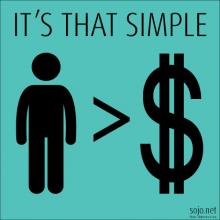
Living in poverty has always been a struggle, but in Alabama being poor could land you in prison. According to a recent story in The New York Times, Alabama resident Gina Ray was locked up for over a month because she couldn’t pay fees and fines related to minor traffic offenses. Speeding while poor shouldn’t land someone in jail. This punishment doesn’t fit the crime.
Why would such morally outrageous penalties be imposed for such minor violations? Because criminal justice has become big business. Private companies are making millions of dollars running prisons, administering probation systems, and providing health care to those living behind bars.
Earl Ofari Hutchinson writes for The Huffington Post:
USA Today reports on a new study by the Annie E. Casey Foundation, called Kids Count:
The well-being of American children looks to be a mixed bag, with gains in academic achievement and health offset by growing economic distress, a new study finds.
Employee rights activists Mary Kay Henry and Christine L. Owens write for CNN:
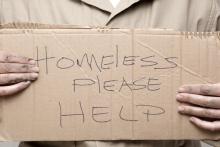
My students had questions about the central character in the story Fly Away Home written by Eve Bunting and illustrated by Ronald Himler. And even as 2nd graders, they knew something about the problem.
"Homelessness is mean," said James.
"I pass the Salvation Army on my bus on the way to school every day. I know homeless people sleep there," Billy added.
Fly Away Home tells the story of a boy who lives in an airport with his dad because they have lost their home. They move through the terminals to avoid being noticed by passengers. The story places you in the boy’s shoes and helps you see the world through his eyes. You feel the pain of the dad who can no longer provide a home for his family. You experience what it’s like to have all of your possessions in two blue bags. This is just the right book to help students and teachers think about how we view people who are homeless.
After reading the story to my students, I asked a few questions about homelessness.
Chris Hedges has a fascinating piece for Salon on the betrayal of the most vulnerable by war:
"We condition the poor and the working class to go to war. We promise them honor, status, glory, and adventure. We promise boys they will become men. We hold these promises up against the dead-end jobs of small-town life, the financial dislocations, credit card debt, bad marriages, lack of health insurance, and dread of unemployment. The military is the call of the Sirens, the enticement that has for generations seduced young Americans working in fast food restaurants or behind the counters of Walmarts to fight and die for war profiteers and elites.
The poor embrace the military because every other cul-de-sac in their lives breaks their spirit and their dignity. Pick up Erich Maria Remarque’sAll Quiet on the Western Front or James Jones’s From Here to Eternity. Read Henry IV. Turn to the Iliad. The allure of combat is a trap, a ploy, an old, dirty game of deception in which the powerful, who do not go to war, promise a mirage to those who do."
Read the full article here
Ever wondered how the poverty rate has changed over the years? And how that breaks down by various demographic categories? You could spend several hours poring through the annual reports by the Census Bureau and find all the data.
Here’s an easier (and more interesting) way. Our friends at Demos, an organization that “combines research, policy development and advocacy to influence public debate and catalyze change,” have created a series of interactive graphs that can answer all your questions.
Tracking American Poverty & Policy contains the data on the U.S. poverty rate annually from 1967 to 2010, including the rate of those in “deep” poverty and those near poverty when you zoom in on the graph. Then follows a set of graphs for the same time period by race, gender, age, educational level, and family; with the same three breakdowns.
It’s a useful resource for historical data on poverty, and it’s fun to play with the graphs to find the data.

A common rationalization those in religious circles make for cutting social programs that help the poor is that church should be the one helping “the least of these,” not the government. But if we know that’s not possible given the church’s means, that millions will get left behind because our efforts fall far too short, is that still a logical line of defense? Jesus told us to care for the poor, sick, and vulnerable—he didn’t prescribe how.
Sometimes Jesus healed people one-on-one. Sometimes he addressed the needs of a multitude by providing enough food to feed them all. Sometimes he sent others in his stead to provide healing.
If we ignore the needy in our midst by getting rid of one huge way to address that need, we are not following Jesus’ example.

In the name of protecting the “middle class” some politicians have been pressing for extensions of the Bush Tax Cuts for all earnings up to $1 million. They are calling folks in the top 1 percent “middle class.” This week, President Obama announced that he would extend the Bush era tax cuts for all earnings up to $250,000, but not beyond this threshold. Still hard to swallow the idea of those being “middle class” tax breaks but it’s an improvement from calling millionaires “middle class.”
While Jesus loves everybody, there is no Christian tradition of teaching God’s “preferential option for the middle class.” For Christians, it’s still about the poorest and most vulnerable, and here is why these tax issues matter to those Jesus called “the least of these.”
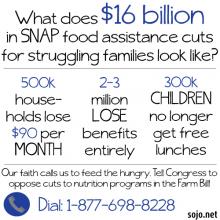
Religion reporter Amy Sullivan has an interesting piece in The New Republic today on the politics surround the deep cuts to government food programs being proposed by the House Agriculture Committee.
As she notes:
"Some conservatives have argued that government shouldn’t even be in the business of feeding people—that the job should be handled by local congregations and other community organizations. Paul Ryan has sparred with Catholic bishops who oppose cuts to SNAP, quipping that 'a preferential option for the poor does not mean a preferential option for big government.'”
The article goes on to note that, while churches were the only social safety net the country had for many years, it was the Great Depression which ended this role. Quoting from an article by Alison Collis Greene:
“'The Depression crippled churches’ finances, and the economic downturn forced them to slash services when people needed help most. Religious leaders and local church members alike recognized the crisis, and many demanded that the federal government intervene.'”
Sullivan argues that we find ourselves in a situation not so different to that of the 1930s today:
"We are watching a similar situation play out now. Many religious traditions and individual churches were struggling when the recession began. The Catholic church was dealing with the fallout from the priest sex abuse scandals. It and other traditions are still embroiled in debates over homosexuality that have led to splits or caused members to leave altogether. Congregational membership levels are down in almost every religious tradition. And as a result, their resource pools have shrunk."
Yes, smarter and more effective government programs are vital when budgets are being cut across the board. But indiscriminate cuts to vital services like the Supplemental Nutrition Assistance Program (SNAP) and calls for churches to pick up the pieces are simply immoral and ultimately impossible.
The cuts being proposed by the Committee will have a devastating impact on poor Americans. It’s time to stand up for the poorest and more vulnerable. You can help. Tell Congress to oppose cuts to nutrition programs in the Farm Bill today.
NPR report on the plight of the poorest in Reading, Pa. - the poorest city in the United States:
"Like many mothers in Reading, Boggs has no husband to share the bills. Poverty is high, but it's a lot higher for single mothers. An astounding 66 percent of them in Reading live below the poverty line, less than $19,000 for a family of three. Boggs admits that she made some bad decisions in life and that her daughters' two fathers turned out to be unreliable. But, she quickly adds, "I wouldn't change anything in the world for my kids, my daughters. They're what keeps me going and keeps me fighting to keep searching, as bad as the economy is. If it was just me, I would have [given] up a long time ago." You hear that a lot around the learning center: hope that things will get better if you just keep plugging away, despite the bad times."
Learn more here
A New York Times op-ed this week examined the growing phenomenon of poverty in the suburbs:
"Hardship has built a stronghold in the American suburbs. Whatever image they had as places of affluence and stability was badly shaken last year, when reports analyzing the 2010 census made it clear that the suburbs were getting poorer.
While the overall suburban population grew slightly during the previous decade, the number of people living below the poverty line in the suburbs grew by 66 percent, compared with 47 percent in cities. The trend quickened when the Great Recession hit, as home foreclosures and unemployment surged. In 2010, 18.9 million suburban Americans were living below the poverty line, up from 11.3 million in 2000."
Learn more here
Writing for The Huffington Post last Friday, Richard C. Leone asks:
"So is a renewal of the war against poverty in the offing? The current balance of political forces suggests that, rather than muster all the weapons we have to fight for the poor, many are willing to settle for uneasy neutrality. This is one "war of choice" we choose not to wage. Austerity is the watchword of the day defined somewhat differently but accepted by the mainstream of both parties as the bedrock of policy for the foreseeable future…
It's past time to connect the dots and see that by ignoring the poor we undermine the welfare of everyone in the 99 percent living from pay check to pay check. We must revive our generous national nature. And more selfishly come to see that we might find ourselves in their shoes. It may be that the poor will always be with us, but that doesn't mean it's OK to ignore them."
Read more here

Sister Kathy Long turned toward my 13-year-old daughter and asked one question: “What will you tell your friends about spending this month in Mexico?”
In a public park in Cuernavaca, Mexico, we sat on a concrete bench next to six women who chatted and stitched embroidery patterns with brightly colored thread.
I glanced toward the sewing group, realizing that Maya would have rolled her eyes if I had asked her that same question. An intrusive query from a mother seemed compelling coming from a Catholic nun who worked in Mexico, promoted justice amid poverty, and even spent three months in jail for protesting the military training of Latin American leaders in the U.S.
“I will tell them that rich people and poor people are all people in the end,” Maya responded. “If you have three cars and two houses, you are a person just like someone whose house is made of cardboard or metal.”